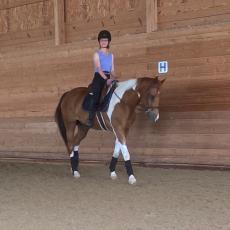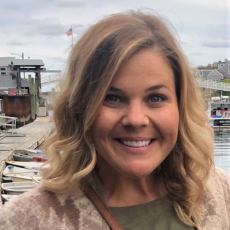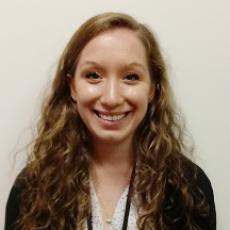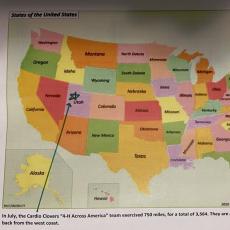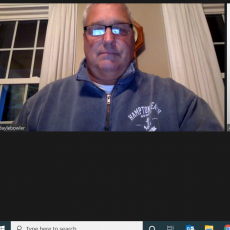In Our Spotlight
UMass Extension Dives Into the Digital Deep End
When the global pandemic took hold in March, the world was reshaped before our eyes. Normal routines were tossed aside and in many cases, remain there. For those with internet access, an era of online communication geared up with surprising speed in nearly every sector of society.
At UMass Extension, rapid responses to meet the needs of residents in the Commonwealth were impressive and almost immediate. Traditional in-person gatherings led by extension educators (things like agricultural workshops, 4-H county fairs and cooking classes at farmer’s markets) switched to online meetings overnight. For many, this change is delivering rich, content-filled activities and information in surprisingly effective ways.
Here are a few examples of how UMass Extension faculty and staff have hit the ground running toward the future.
For 4-H the Future Will be More Digital
For decades, young 4-H members have showed sheep at the county fair, attended a 4-H camp, or, more recently, created robotic models with their teams. But not now. Linda Horn, interim director of UMass Extension 4-H, has worked closely with her staff to reinvent traditional in-person programs. Program leaders across the state evaluated 4-H offerings with fresh eyes, then changed them up with innovative new topics like Career Explorations and 4-H Across America, and reinvented the traditional 4-H Fair to roll out the first Massachusetts Virtual 4-H Fair in late August. Horn said, “Our staff have also discovered that we enjoy meeting remotely! Meetings are more frequent and efficient with useful updates, and we are saving time and money by not traveling. There is an eagerness to look at our programs in a new way. The future will be more digital. It’s clear to us that we need to adapt or become extinct.” The post-pandemic future is a hybrid one, with more online offerings than we would have imagined pre-pandemic.
4-H Across America 2020
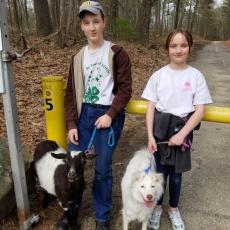 Turns out, if you start off on the right foot, you can walk across the country from Boston, Massachusetts to Sacramento, California. By calculating how far their steps (or bike miles, swim laps or horse trots) took them, teams of four 4-H’ers made steady progress moving from state to state-- all recorded on a U.S. map. (The conversion rate is: 1 mile of walking counts as 20 miles.) On their walks, the 4-Hers integrated math skills, geography and history of towns into good exercise. In June and July, one team from Hampden County, the Cardio Clovers, made it to the west coast and began the return to Boston in August. The Belchertown Seek and Discover Team of four (plus two pets) has traversed the United States an amazing three times since the spring. Team leader Jen Zawalski reports that, as of August 31, her team had clocked in 24,524 miles. Zackery Zawalski, 11th grader, figures he will just keep walking across America because he thinks that it has become a good habit for him. Often, his goat, Willow, accompanies him. They have become such a familiar sight, that neighbors are disappointed if they do not see them trotting down the road together.
Turns out, if you start off on the right foot, you can walk across the country from Boston, Massachusetts to Sacramento, California. By calculating how far their steps (or bike miles, swim laps or horse trots) took them, teams of four 4-H’ers made steady progress moving from state to state-- all recorded on a U.S. map. (The conversion rate is: 1 mile of walking counts as 20 miles.) On their walks, the 4-Hers integrated math skills, geography and history of towns into good exercise. In June and July, one team from Hampden County, the Cardio Clovers, made it to the west coast and began the return to Boston in August. The Belchertown Seek and Discover Team of four (plus two pets) has traversed the United States an amazing three times since the spring. Team leader Jen Zawalski reports that, as of August 31, her team had clocked in 24,524 miles. Zackery Zawalski, 11th grader, figures he will just keep walking across America because he thinks that it has become a good habit for him. Often, his goat, Willow, accompanies him. They have become such a familiar sight, that neighbors are disappointed if they do not see them trotting down the road together.
Zackery has also discovered that 4-H virtual activities across the country offer a chance to participate in new programs. JenaRose describes herself as a very active person who would go crazy if she sat around all day. Reporting her miles each day has made her realize how much exercise she really does. She and her dog Lily, along with Zackery and Willow, have become a reliable part of the Belchertown scene.
Across Massachusetts, 36 teams have taken the challenge. A new way to see America!
Career Explorations
Angelica Paredes, extension educator in western Mass., has organized 4-H activities for 22 years. With the abrupt loss of in-person meetings, she quickly gathered 4-Her’s and staff for a mini brain-storming session to learn about topics that would interest them. A strong preference emerged to explore various careers. Paredes developed a Career Exploration Zoom Series as she lined up a sheriff, an archeologist, a legislator and an astronomer. Up to 20 youth have had the chance to talk with an expert at each Zoom meeting to find out what training is needed to do their job. The professionals who participated were delighted to be interviewed and offered great insight about specific details of their work. Most sessions are moderated by 4-H teens.
“Feedback has been wonderful. Parents and youth have reported looking into opportunities (such as the Peace Corps) or learning how passions of theirs (animals, sciences, etc.) can merge into one career,” said Paredes. Although some youth may not have been overly interested in a particular presenter beforehand, they were often completely surprised by the realities of the jobs. Word has also begun spreading, with 4-Hers from other states joining the calls. Paredes is not aware of other 4-H clubs offering similar programs, but some states share her flyers.
To register for sessions, email Angelica Paredes at angelica@umext.umass.edu and include “4-H CES” in subject line.
First Virtual 4-H Fair in Massachusetts
August 29 dawned with great anticipation for a group of Massachusetts children and teens, as the first-ever Massachusetts Virtual 4-H Fair got underway. This fair was unlike prior 4-H Fairs—which have a long tradition-- because no cows, sheep or horses displayed their groomed bodies or high steps in outdoor rings. There were no halls overflowing with sewing projects, robotic models or photography on the walls. Massachusetts 4-H members were able to enter their projects in the online fair during the first two weeks of August through a specialized fair software program. Then, volunteer judges viewed the entries, evaluated them, and provided placings and awards.
According to staff, 4-H’ers, and parents, it passed the test as a “real fair” and even won a blue ribbon.
In all, 203 4-H youth took part in the fair with a total of 1,263 entries. In the “nice outcome” category was the fact that some 4-H youth who never took place in a face-to-face 4-H fair were able to join in this year. Read more.
4-H is well-known for responding to community needs. In March, right out of the box, when face masks were required in many venues but in very short supply, many 4-H club members from the Berkshires to Cape Cod set their sewing machines humming as they cut material and stitched hundreds of masks to share with medical facilities as well as friends and neighbors.
Extension Agriculture Program Goes Virtual
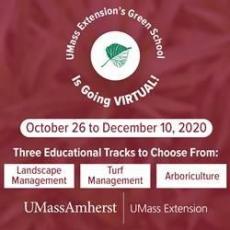 Green School Remains a Rich Educational Experience
Green School Remains a Rich Educational Experience
What happens when your signature program, offered every two years, is suddenly faced with all the limitations of a pandemic? The UMass Extension Landscape, Nursery, and Urban Forestry Program (LNUF) and Turf Program, part of the Extension Agriculture Program, reinvents it, that’s what happens. The very popular 12-day certificate short course, Green School, has been scheduled for late 2020 since the last time it was offered in 2018. In the past, professional horticulturists, arborists, grounds managers, turf management professionals and those who seek a refresher course are among those to arrive from across Massachusetts and New England to learn from UMass Extension faculty, staff, and invited speakers.
When this unique learning opportunity was challenged by the pandemic, Tawny Simisky, extension entomologist and interim team leader for LNUF along with Jason Lanier, interim team leader for Turf, and Ellen Weeks, educational programs manager, rolled up their sleeves and reimagined it as a virtual experience. With the help of 20 instructors for Green School, the group believes this first-time-ever virtual offering will be a special experience for participants.
Among the challenges of creating an online classroom was to set up and maintain a structure that was flexible and encouraged all participants to obtain the information they needed. Students need freedom to learn on their own schedules and the twenty instructors have to prepare materials on their own unique timeframes. Simisky commented that, “Green School participants are highly-motivated students who usually ace the quizzes given after each class.”
Some advantages of virtual Green School that she mentioned include: reduction in registration costs thanks to reduced overhead; savings of time and travel expenses; and greater access for more students. One early registrant is a new mother who lives on Martha’s Vineyard, so travel was not possible, but she is set to go with this option. Recently, a professional company from Maine registered a large number of its employees, also taking advantage of the new virtual experience. Interested?
Winter School for Turf Managers
Meanwhile, another stellar university commercial horticulture program is also moving online: UMass Winter School for Turf Managers. Jason Lanier, team leader and extension educator, is happy to be part of new directions for this offering, a one-of-a kind in this country. Since 1925, “Winter School” has provided specific turf education to those who need it—the professionals who manage the turf in parks, playing fields, golf courses and other settings.
Lanier and Simisky agree that the tremendous thrust in the direction of online education for the entire campus is a clarifying moment. Lanier says, “We are lucky to be a part of the virtual world and have taken advantage of a lot of tools and support for remote delivery. It has been an opportunity to meet new people across campus and appreciate the infrastructure already put in place (Zoom, GoToWebinar, and more) that have helped us make this transition smoother.”
For more information on Winter School, contact Jason Lanier at jdl@umass.edu or go to the program’s web page.
Nutrition Education Program Serves Up Resources In New Ways
 For a community-based program that works directly with low-income students and families, UMass Extension nutritionists and staff needed to create a total shift in their day-to-day work. They have had to move away from interactive and hands-on meetings to Zoom and online information.
For a community-based program that works directly with low-income students and families, UMass Extension nutritionists and staff needed to create a total shift in their day-to-day work. They have had to move away from interactive and hands-on meetings to Zoom and online information.
So how is it going? As with other extension programs, they have cooked up just as good a dish with a brand new recipe. Educators in the Program’s SNAP-Ed and EFNEP groups now provide a weekly “Nutrition Bites” newsletter in both English and Spanish to participants, partners and program collaborators. In this online resource, they share recipes and nutrition information, ideas for physical activities that families can do together, and offer food access, safety information and resources that are helpful during this time. Program director Lisa Sullivan-Werner says, “The goal right now is to figure out how to get the most impact and consistency while also responding to local needs in a way that is meaningful and impactful.” Nutrition education teams continue to respond to the situation as it evolves, with a current focus on developing a social media presence and technological tools for the future. Newsletters and videos of shorter lessons on nutrition are working well. They have found that SNAP-Ed classes with exercise are not so successful.
On the ground in Worcester, nutrition educator Kate Mariani shares ways in which challenges for providing nutritional education are being met. Although purchasing computers is not possible for many of the families she works with, they benefit from a generous wider community. A combination of business and private donors as well as grants obtained by schools, have resulted in Google chrome books given to children. Some cable companies also provided free WiFi in areas of the city where needs are greatest. “We offered virtual lessons this past summer for children and families and it went very well. It was great to see their faces and for them to see us after months of no human contact,” she said. She found video clips from USDA with recipes that matched seasonal fruit and vegetables availability at local farmer’s markets and shared them with good success. Mariani offered specific areas of success, “What worked very well is handing out recipes at farmer’s markets, providing useful resources in new ways, and now we are working with schools to offer our curriculum virtually.” She says the summer program was rewarding because of how well and quickly the children adapted.
Down the road in Raynham, Keryn LeBlanc and Kimberly Lagasse, nutrition extension educators for the southeast region, have revised their work for adult and youth programs to take place in three ways; digital lessons via Zoom, pre-recorded lessons, and lesson plans for teachers to provide nutrition education on their own. As in other areas of the state, many school districts are providing laptops for their students to increase access to online learning and technology, while other organizations have applied for grants to provide smartphones for their participants. Also, SNAP participants can apply for assistance to receive affordable internet access. Finally, they are working successfully with shelters, some of whom have chosen Zoom-based lessons while others have chosen pre-recorded lessons.
For more information on other substantial pivots made by programs during the pandemic, go to ag.umass.edu/coronavirus.



